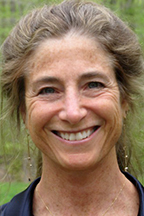Tara Brach talks about waking up to racism in our culture and how her Washington, DC, Insight Meditation community is doing something about it.
Omega: In recent months there has been significant unrest in various parts of the country as a result of racially charged conflict between civilians and police. What is the path to healing for a society with such deeply rooted racism, fear, and anger?
Tara: During the Baltimore riots I was reminded of a quote from Martin Luther King, Jr., "But it is not enough for me to stand before you tonight and condemn riots. It would be morally irresponsible for me to do that without, at the same time, condemning the contingent, intolerable conditions that exist in our society. These conditions are the things that cause individuals to feel that they have no other alternative than to engage in violent rebellions to get attention. And I must say tonight that a riot is the language of the unheard."
The first step in responding to strong emotions--our own or others'--is to seek to understand. What is the suffering giving rise to this anger? If we can pause, and instead of reacting or judging, look to see the suffering, our heart's response will be compassionate and wise.
For those of us in the dominant culture, it's challenging yet essential that we respond to the hurt and anger that has built up through generations of violence against people of color. The legacy of slavery requires that we in the dominant culture take responsibility for participating in a society that rewards us for our whiteness. Taking responsibility means seeking ways of reparation, ways to address the institutionalized injustice and inequities leading to one out of three African American men being imprisoned in their lifetime, twice as many blacks as whites unemployed, and median income of black households at less than 60% of white ones. And the inequities are widening!
As individuals in the dominant culture we need to start by educating ourselves to white privilege and stay present with our own reactivity to what's happening--looking at our own fears and confusion, bringing an honest, kind, clear attention to our own experience. This certainly doesn't mean believing our beliefs, it means bringing mindfulness to our own emotions. If we can be present and kind toward our inner states, we will start seeing how we create separation from others. This will enable us to be more clear and wise in bearing witness to others' ways of expressing pain.
As communities, the deep, transformative healing can arise from collective dialogue. This means same race groups would look into their own wounds and blind spots with the intention of deepening self-understanding. Small interracial groups would form so that those of us who have locked into ideas of other as "enemy," or "inferior," or "wrong" can practice speaking and listening together with mindfulness and compassion and learn to see through each other's eyes.
For instance, we need circles made up of police and civilian families who have been violated by police. These and other mixed race circles require a safe container, guidelines on communicating, and a commitment to stay, speak truthfully, and listen with as much heart as possible. There are a growing number of models for these processes of reconciliation--dialogue is happening in this country and elsewhere.
This domain of honest dialogue creates the groundwork for healing and awakening from the painful trance of separation. It can reconnect us to our sense of interconnectedness and caring. And importantly, it energizes action to relieve suffering. There will be no healing until those of us in the dominant culture join in solidarity with people of color to end institutionalized racism. This means confronting the ongoing discrimination against people of color--be it in the domain of education, employment, housing, or the judicial system.
Omega: How is your sangha (Buddhist community) addressing the issue of racism?
Tara: Much of our community is white, so we are exploring our own blindness around white privilege. Through a yearlong white awareness group, we're looking at the ways we create separation, because as long as there is separation none of us is free. Most of our community's white senior teachers and white board members are involved.
We have equity and inclusivity trainings, and experienced facilitators to help us look honestly at how we've gotten caught in certain perspectives and behaviors. We've created scholarships for people of color to participate in our activities and retreats. We have several teachers of color and leaders of color in our community and are looking to expand the number. We regularly bring in guest teachers of color. Our organization supports affinity groups within our community, and the People of Color group is flourishing. A small group of us are participating in a diversity sangha (community) dedicated to deepening our understanding and affiliation. And as individuals we're engaging in solidarity with groups in the larger community that are dedicated to ending racism.
At the upcoming buddhafest.org event in DC on June 14, I'll be part of a panel with Rev. angel Kyodo williams and others to talk about this work and its challenges.
Omega: Are there resources you would recommend for other groups looking to work with the issues of racism and white privilege?
Tara: A good place to start is with the three-part documentary Race: The Power of An Illusion. Watching this video can be a powerful way to begin to understand how racial dominance has been established and maintained. I also liked the book We Can't Teach What We Don't Know by Gary Howard. Even though it focuses on education, it gives a great context for understanding white dominance, and outlines how we can create a positive, socially transformative white identity. You can also find resources and Dharma-based support for developing a racial awareness program at whiteawake.org.
To read more from Tara Brach, click here.
© 2015 Omega Institute for Holistic Studies, Inc. All rights reserved.

